Related Research Articles
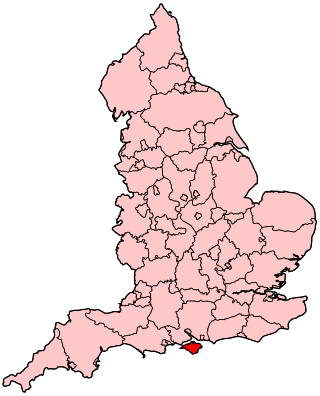
Isle of Wight was a constituency that was last represented in the House of Commons of the UK Parliament from 2017 until 2024 by Bob Seely, a Conservative.

Blackburn is a constituency in Lancashire, England, which is represented in the House of Commons of the UK Parliament by independent politician Adnan Hussain. From 2015 to 2024 it was represented by Kate Hollern of the Labour Party and, from 1979 to 2015, by Jack Straw who served under the Labour leaders of Neil Kinnock and John Smith and the Labour governments of Tony Blair and Gordon Brown.

Preston is a constituency represented in the House of Commons of the UK Parliament since 2000 by Sir Mark Hendrick, a member of the Labour Party and Co-operative Party.

Richmond (Yorks) was a constituency in North Yorkshire in the House of Commons of the UK Parliament. It was represented from 1910 by members of the Conservative Party. The last MP for Richmond was Rishi Sunak, the former Prime Minister and Conservative leader from 2022 to 2024.

Dewsbury was a constituency created in 1868 and abolished in 2024.
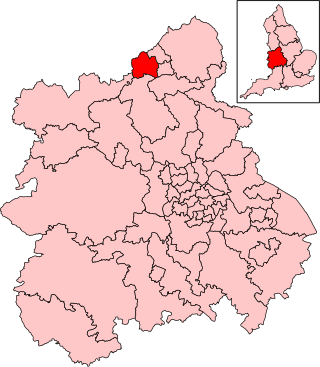
Newcastle-under-Lyme is a constituency in northern Staffordshire created in 1354 and represented in the House of Commons of the UK Parliament since 2024 by Adam Jogee of the Labour Party.
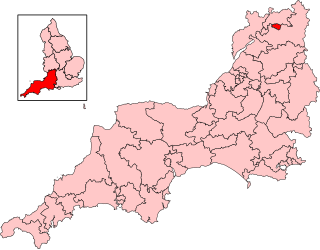
Cheltenham is a constituency in Gloucestershire represented in the House of Commons of the UK Parliament since 1832. As with all constituencies, it elects one Member of Parliament (MP) by the first past the post system of election at least every five years. Since 2024, its MP has been Max Wilkinson of the Liberal Democrats.

Devizes was a constituency in Wiltshire, England, which included four towns and many villages in the middle and east of the county. The seat was held by members of the Conservative Party continuously for a century from 1924.

Reigate is a constituency in Surrey represented in the House of Commons of the UK Parliament since 2024 by Rebecca Paul, of the Conservative Party.

Shrewsbury is a parliamentary constituency in England, centred on the town of Shrewsbury in Shropshire. It has been represented in the House of Commons of the Parliament of the United Kingdom since 2024 by Julia Buckley.
Flintshire was a parliamentary constituency in North-East Wales which generally returned one Member of Parliament (MP) to the House of Commons, latterly that of the Parliament of the United Kingdom, from 1542 until it was abolished for the 1950 general election.
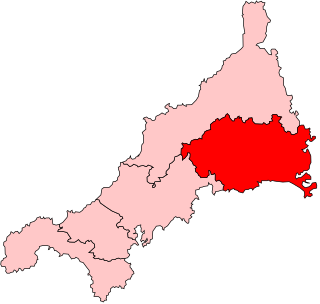
Bodmin was the name of a parliamentary constituency in Cornwall from 1295 until 1983. Initially, it was a parliamentary borough, which returned two Members of Parliament to the House of Commons of England and later the House of Commons of the Parliament of the United Kingdom until the 1868 general election, when its representation was reduced to one member.
Islington West was a borough constituency in the Metropolitan Borough of Islington, in North London.
Oldham was a parliamentary constituency centred on the town of Oldham, England. It returned two Members of Parliament (MPs) to the House of Commons of the Parliament of the United Kingdom. The constituency was created by the Reform Act 1832 and was abolished for the 1950 general election when it was split into the Oldham East and Oldham West constituencies.
Cockermouth was the name of a constituency of the House of Commons of the Parliament of England in 1295, and again from 1641, then of the Parliament of Great Britain from 1707 to 1800 and of the Parliament of the United Kingdom from 1801 to 1918. It was a parliamentary borough represented by two Members of Parliament until 1868, and by one member from 1868 to 1885. The name was then transferred to a county constituency electing one MP from 1885 until 1918.
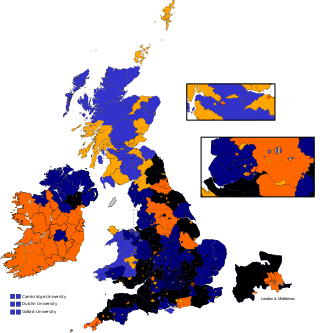
East Somerset was the name of a parliamentary constituency in Somerset, represented in the House of Commons of the Parliament of the United Kingdom between 1832 and 1918.
Droitwich was the name of a constituency of the House of Commons of England in 1295, and again from 1554, then of the House of Commons of Great Britain from 1707 to 1800 and of the House of Commons of the Parliament of the United Kingdom from 1801 to 1918. It was a parliamentary borough in Worcestershire, represented by two Members of Parliament until 1832, and by one member from 1832 to 1885. The name was then transferred to a county constituency electing one MP from 1885 until 1918.
Flint Boroughs was a parliamentary constituency in north-east Wales which returned one Member of Parliament (MP) to the House of Commons of the Parliament of the United Kingdom and its predecessors, from 1542 until it was abolished for the 1918 general election.
The October 1888 Merthyr Tydfil by-election was a parliamentary by-election held for the House of Commons constituency of Merthyr Tydfil in Wales on 26 October 1888.
The 1880 Caernarvonshire by-election was a parliamentary by-election held for the House of Commons constituency of Caernarvonshire in Wales on 2 December 1880.
References
- ↑ "Death of Mr. Henry Richard, M.P." . Huddersfield Chronicle. 25 August 1888. Retrieved 20 December 2015– via British Newspaper Archive.
- ↑ Dictionary of National Biography, Second Supplement.
- ↑ "The General Election" . The Morning Post . 25 November 1885. p. 2. Retrieved 26 November 2017– via British Newspaper Archive.
- ↑ Craig, F. W. S. (1974). British parliamentary election results 1885-1918 (1 ed.). London and Basingstoke: The Macmillan Press Ltd. ISBN 9780333169032. Page 476